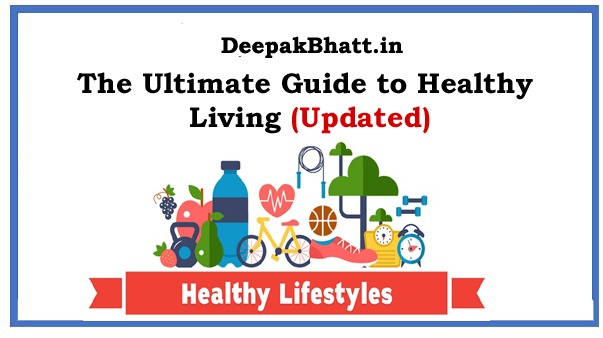The Ultimate Guide to Healthy Living Living a healthy lifestyle is not just about eating well and exercising regularly
It is also about taking care of your mental, emotional and spiritual health. In this ultimate guide to healthy living, we will discuss the different areas of our lives that we need to focus on in order to achieve optimal health and well-being.
Software Testing Bootcamp Complete Course
Microsoft Power BI: A Comprehensive Guide
The Ultimate Guide to Healthy
Healthy eating tips for busy Americans
Weight Loss Tips: Belly fat can be reduced in a few days
4 Types of Yogasan to Improve Flexibility
Weight Loss Water: 3 Type of Water
How to be Fair & Glowing Skin Naturally
1. Eating a Balanced Diet:
A healthy diet is the foundation of a healthy lifestyle. It is important to consume a balanced diet that includes a variety of fruits, vegetables, whole grains, lean proteins, and healthy fats. This will help you get all the necessary nutrients your body needs to function properly. Eating a balanced diet can help reduce your risk of chronic diseases such as heart disease, diabetes, and cancer.
Eat a variety of fruits and vegetables: Aim for at least five servings of fruits and vegetables per day. Choose a variety of colors to ensure that you are getting a variety of nutrients.
Choose whole grains: Choose whole grains over refined grains whenever possible. Whole grains contain more fiber, vitamins, and minerals than refined grains.
Eat lean proteins: Choose lean proteins such as chicken, fish, beans, and legumes. Limit your intake of red meat and processed meats.
Choose healthy fats: Choose healthy fats such as avocados, nuts, seeds, and olive oil. Limit your intake of saturated and trans fats.
Limit processed foods: Processed foods are often high in sodium, sugar, and unhealthy fats. Try to limit your intake of processed foods and choose whole foods instead.
Drink plenty of water: Water is essential for our bodies to function properly. Aim for 8-10 glasses of water per day.
Control portion sizes: Pay attention to portion sizes and try to eat until you are satisfied, not stuffed.
2. Exercise Regularly:
Regular physical activity is essential for maintaining good health. Exercise not only helps you to maintain a healthy weight, but it also improves your cardiovascular health, strengthens your bones and muscles, and boosts your mood. Aim for at least 30 minutes of moderate exercise most days of the week.
Find an activity you enjoy: Choose an activity that you enjoy such as dancing, swimming, cycling, or walking. This will make it more likely that you will stick to it.
Start slow: If you are new to exercise or have been inactive for a while, start slowly and gradually increase the intensity and duration of your workouts.
Aim for at least 30 minutes per day: Aim for at least 30 minutes of moderate exercise most days of the week. This can be broken up into shorter sessions throughout the day if needed.
Mix it up: Incorporate a variety of activities into your routine to prevent boredom and challenge your body in different ways.
Strength train: Incorporate strength training exercises into your routine to help build and maintain muscle mass.
Stay hydrated: Drink plenty of water before, during, and after exercise to stay hydrated.
Listen to your body: Pay attention to how your body feels during and after exercise. If you feel pain or discomfort, adjust your workout or rest if needed.
3. Get Enough Sleep:
Sleep is essential for our physical and mental health. Most adults need 7-9 hours of sleep per night. Lack of sleep can lead to a variety of health problems such as obesity, diabetes, and heart disease. Establish a regular sleep schedule and practice good sleep hygiene to improve the quality of your sleep.
Stick to a regular sleep schedule: Go to bed and wake up at the same time each day, even on weekends.
Create a relaxing sleep environment: Make sure your bedroom is quiet, dark, and cool. Use comfortable bedding and a comfortable mattress.
Limit caffeine and alcohol: Avoid caffeine and alcohol close to bedtime as they can interfere with sleep.
Avoid electronics before bedtime: The blue light emitted by electronic devices can interfere with the body’s production of melatonin, a hormone that regulates sleep.
Relax before bedtime: Take a warm bath, read a book, or listen to calming music to help you relax before bedtime.
Exercise regularly: Regular exercise can help you fall asleep faster and sleep more soundly. However, avoid exercising close to bedtime as it can interfere with sleep.
Limit daytime naps: If you take daytime naps, limit them to 20-30 minutes and avoid taking them late in the day.
4. Manage Stress:
Stress can have a negative impact on our physical and mental health. It is important to find healthy ways to manage stress such as exercise, meditation, deep breathing, or talking to a friend. Avoid using alcohol or drugs to cope with stress.
Identify your stressors: Take note of situations or events that cause you to feel stressed. This can help you develop strategies for managing stress in the future.
Practice relaxation techniques: Try deep breathing exercises, meditation, yoga, or progressive muscle relaxation to help you relax and reduce stress.
Exercise regularly: Exercise can help reduce stress and improve mood. Aim for at least 30 minutes of exercise most days of the week.
Get enough sleep: Lack of sleep can contribute to stress and make it more difficult to cope with stressors.
Connect with others: Spending time with friends and family, or participating in social activities can help reduce stress.
Manage your time: Prioritize your tasks and make a schedule to help manage your time effectively and reduce stress.
Seek support: Talking to a trusted friend, family member, or mental health professional can help you manage stress and develop coping strategies.
5. Drink Plenty of Water:
Water is essential for our bodies to function properly. It helps to regulate body temperature, transport nutrients, and remove waste. Aim for 8-10 glasses of water per day, and avoid sugary drinks such as soda and juice.
Carry a water bottle: Keep a refillable water bottle with you throughout the day to make it easy to stay hydrated.
Set a goal: Aim to drink a certain amount of water each day, such as 8 glasses or 2 liters.
Drink water with meals: Drink water with meals instead of sugary drinks like soda or juice.
Eat water-rich foods: Fruits and vegetables like watermelon, cucumber, and lettuce are high in water content and can help keep you hydrated.
Drink water before, during, and after exercise: Drink water before, during, and after exercise to stay hydrated and replace fluids lost through sweat.
Listen to your body: If you feel thirsty, drink water. Thirst is a signal that your body needs more water.
Watch for signs of dehydration: Symptoms of dehydration include dry mouth, fatigue, headache, and dark urine. If you experience any of these symptoms, drink more water.
6. Practice Safe Sex:
Practicing safe sex is important for protecting your sexual health. Use condoms to prevent sexually transmitted infections and practice regular testing if you are sexually active.
Use condoms: Use condoms correctly and consistently to protect against STIs and unintended pregnancies.
Get tested: Get tested for STIs regularly, especially if you have multiple sexual partners.
Limit sexual partners: Limit the number of sexual partners you have to reduce the risk of contracting STIs.
Communicate with your partner: Talk openly and honestly with your partner about sexual history, STI testing, and contraception.
Use additional contraception: Use additional contraception, such as birth control pills or an intrauterine device (IUD), to further reduce the risk of unintended pregnancy.
Avoid high-risk behaviors: Avoid high-risk sexual behaviors, such as having sex under the influence of drugs or alcohol.
Consider pre-exposure prophylaxis (PrEP): If you are at high risk for contracting HIV, consider taking PrEP, a medication that can reduce the risk of HIV infection.
7. Limit Alcohol and Tobacco Use:
Alcohol and tobacco can have negative effects on our health. Limit your alcohol intake to moderate levels and avoid smoking or using tobacco products altogether.
Drink alcohol in moderation: Limit alcohol intake to no more than one drink per day for women and two drinks per day for men.
Avoid binge drinking: Binge drinking, or consuming a large amount of alcohol in a short period of time, can be harmful to health.
Quit smoking: Quitting smoking is one of the most important things you can do for your health. If you need help quitting, talk to a healthcare provider.
Avoid exposure to secondhand smoke: Secondhand smoke can also be harmful to health, so avoid exposure whenever possible.
Limit exposure to other harmful substances: Avoid exposure to other harmful substances, such as vaping products and illicit drugs.
Seek help if needed: If you struggle with alcohol or tobacco use, seek help from a healthcare provider or a support group.
8. Maintain Healthy Relationships:
Healthy relationships are important for our mental and emotional well-being. Surround yourself with positive and supportive people, communicate openly and honestly, and seek help if you are struggling with relationship issues.
Communication: Communication is key to maintaining healthy relationships. Be open, honest, and respectful when communicating with others.
Set boundaries: Set boundaries in relationships to ensure that your needs are being met and to maintain a healthy balance.
Practice empathy: Try to understand others’ perspectives and practice empathy in your interactions with them.
Show appreciation: Show appreciation for others and the positive aspects of your relationships.
Address conflicts: Address conflicts in a constructive and respectful way, seeking to understand and find solutions rather than blaming or attacking others.
9. Practice Mindfulness:
Mindfulness is the practice of being present in the moment and fully engaged in the task at hand. This can help reduce stress, improve focus, and boost overall well-being. Practice mindfulness through meditation, deep breathing, or other relaxation techniques.
- Pay attention to the present moment: Focus your attention on the present moment, noticing your thoughts, feelings, and physical sensations without judgment.
- Practice deep breathing: Take deep breaths, focusing on your breath as it moves in and out of your body.
- Practice meditation: Set aside time each day to practice meditation, focusing your attention on your breath or a specific object.
- Practice mindful eating: Pay attention to the sensory experience of eating, savoring each bite and noticing the flavors, textures, and smells of the food.
- Practice mindful movement: Engage in physical activities, such as yoga or tai chi, that emphasize mindfulness and awareness of the body.
- Engage in creative activities: Engage in creative activities, such as painting or writing, that promote mindfulness and self-expression.
- Cultivate gratitude: Focus on the things in your life that you are grateful for, and take time to appreciate them.
10. Seek Regular Medical Care:
Regular medical check-ups and screenings are important for maintaining good health. Visit your healthcare provider regularly and get recommended screenings such as mammograms, colonoscopies, and blood pressure checks.
Schedule routine check-ups: Schedule routine check-ups with a healthcare provider, such as a primary care physician or a gynecologist, depending on your age and gender.
Get preventive screenings: Get recommended preventive screenings, such as mammograms or colonoscopies, to detect health problems early.
Manage chronic conditions: If you have a chronic condition, such as diabetes or high blood pressure, work with your healthcare provider to manage it effectively.
Get recommended vaccinations: Get recommended vaccinations, such as the flu vaccine and the HPV vaccine, to prevent infectious diseases.
Keep track of your health history: Keep track of your health history, including any allergies, medications, and past surgeries or procedures, and share this information with your healthcare provider.
People also ask
1. What are the 7 tips to have a healthy life?
here are the 7 tips to have a healthy life:
- Eat a balanced diet
- Exercise regularly
- Get enough sleep
- Manage stress
- Drink plenty of water
- Limit alcohol and tobacco use
- Maintain healthy relationships.
2. What are the guidelines to healthy living?
- Eat a balanced diet
- Exercise regularly
- Get enough sleep
- Manage stress
- Drink plenty of water
- Limit alcohol and tobacco use
- Maintain healthy relationships
- Practice safe sex
- Seek regular medical care
- Practice mindfulness
- Maintain a healthy weight
- Protect your skin from the sun
- Practice good hygiene, such as washing your hands regularly and covering your mouth when coughing or sneezing
- Stay up to date on vaccinations and recommended health screenings.
3. What are the six basic rules for good health?
here are the six basic rules for good health:
- Eat a healthy and balanced diet
- Exercise regularly
- Get enough sleep
- Manage stress
- Avoid harmful substances
- Seek medical care when needed.
Conclusion:
Living a healthy lifestyle requires commitment and effort, but it is well worth it in the end. By eating a balanced diet, exercising regularly, getting enough sleep, managing stress, and practicing healthy habits, you can improve your overall health and well-being. Remember, it’s never too late to make positive changes and start living a healthier life.
Welcome all of you to my website. I keep updating posts related to blogging, online earning and other categories. Here you will get to read very good posts. From where you can increase a lot of knowledge. You can connect with us through our website and social media. Thank you







